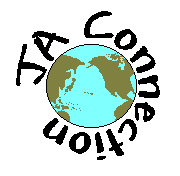
 |
Lesson 2: Basic Vocabulary and Phrases - I |
 |
 |
 |
 |
 |
 |
 |
 |
Page 1 of 1
| I | Watakushi, Watashi |
| We | Watashi-tachi |
| You (singular) | Anata |
| You (plural) | Anata-tachi |
| She | Kanojo |
| He | Kare |
| They | Karera-tachi |
| To go | iku |
| To come | kuru |
| To do | suru |
| To be able | dekiru |
| To speak | hanasu |
| To read | yomu |
| To write | kaku |
| To buy | kau |
| To have | aru |
| Beautiful | kirei |
| Handsome | utsukushi |
| Big | oki |
| Small | chisai |
| Tall | takai |
| Short | hikui |
| Thick (Flat objects) | atsui |
| Thin (Flat objects) | usui |
| Thick (Long objects) | futoi |
| Thin (Long objects) | hosoi |
| Pen | pen |
| Pencil | enpitsu |
| Paper | kami |
| Book | hon |
| Magazine | zasshi |
| Newspaper | shimbun |
| Store | mise |
| Yes | hai |
| No | iie |
| Name | namae |
| It is | desu |
| Isn't it? | desu ne? |
| What | nani (or nan) |
| Very | totemo |
| Not very | anmari |
Unlike English which has "this" and "that", Japanese has three levels of proximity. There are also two grammatical types (pronouns and adnouns) just as in English however, the words change depending on their grammatical role.
| This | kore |
| That | sore |
| That (over there) | are |
| Which | dore |
| This | kono |
| That | sono |
| That (over there) | ano |
| Which | dono |
Examples:
This book = Kono hon
Which book = Dono hon
| Good morning. | Ohayou gozaimasu. |
| Good afternoon. | Konnichiwa. |
| Good evening. | Kombanwa. |
| Good night. (going to sleep) | Oyasuminasai. |
| Nice to meet you. | Hajimemashite. |
| My name is _____. | Watashi-no namae wa _____ desu. |
| How are you? | Ogenki desu ka? |
Note:
"Ogenki desu ka?" is usually used with someone you have met before but have not seen
for a while.
 |
 |
 |
 |
 |
 |
 |
 |